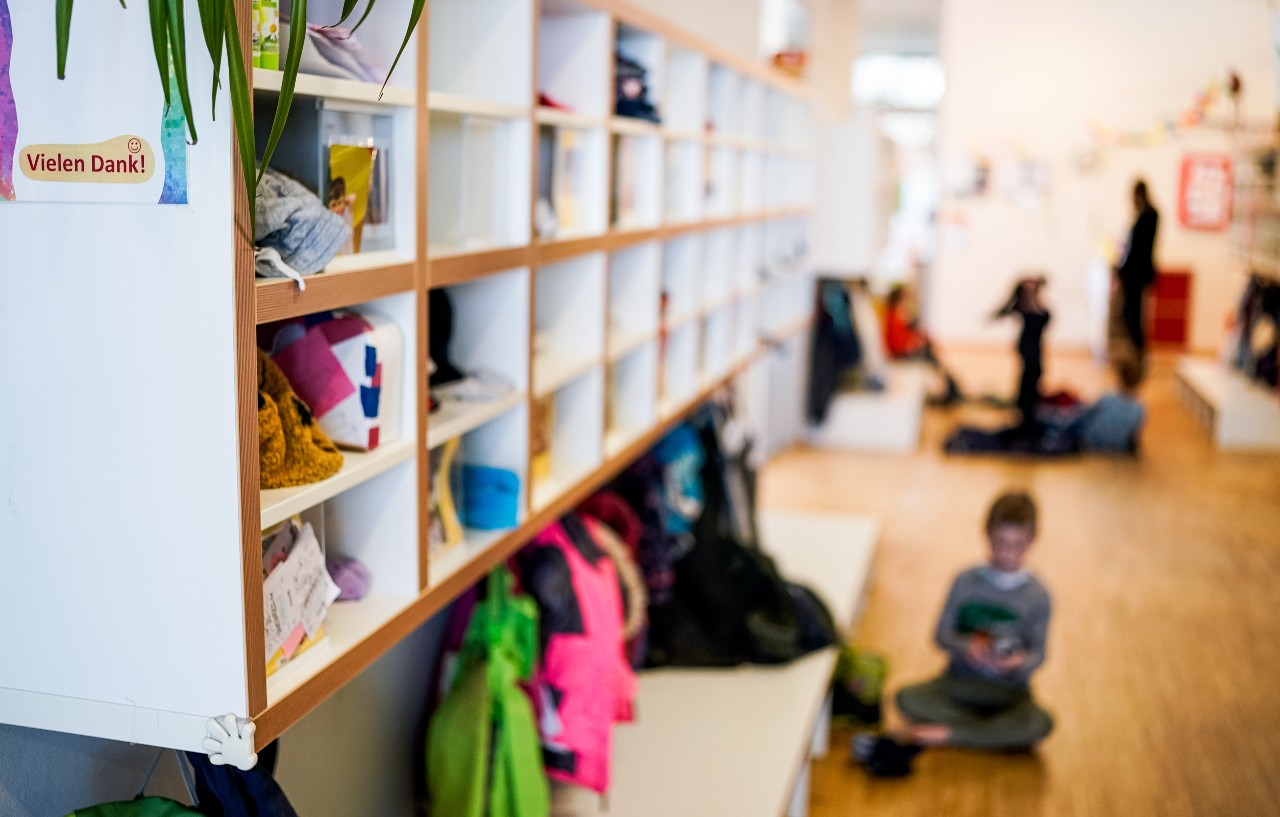More childcare, less paperwork: How Germany can make life easier for foreign parents

As Germany celebrates International Women’s Day, many foreign parents say the government should consider new measures to improve gender equality within households.
Germany ranked sixth in the world for gender equality, according to a 2023 World Economic Report. The report ranks countries for equality of economic and educational opportunities, for health coverage, and for political empowerment.
Still, the gender pay gap is not limited to hourly earnings and bonus payments. Working in lower-paid sectors and fewer working hours also contribute to the gap between men and women’s pay. According to statistics from the German Federal Statistical Office, working women in Germany earned 18 percent less than men in 2023.
Limited childcare options leave expat parents in a bind
However, gender equality is more than bridging the pay gap. Some expat parents in Germany say the government should do more to make full time work possible for both parents.
Julianna ElSayed, mother of a Kita-aged son in Düsseldorf, said extending Kita opening hours would be a great place to start. But, she said, this would only help if the extended hours could be maintained to help parents plan their days.
“We often encounter situations where we have to pick up the children earlier, or the Kita has to be closed or there’s an emergency and people have to pick up the children earlier,” she said. “This caused a lot of tension for us because we are both working, my husband is working full time, I’m working 30 hours per week. It’s hard for me to pick him up earlier.”
Many of the shortened days were caused by staff shortages. This is a problem felt across Germany, and an issue expected to remain for years to come. In a survey published by the German Kindergarten Directors' Congress in spring 2023, 64 percent of the Kita directors surveyed said they had been short-staffed more than 20 percent of the time last year.
READ ALSO: How expensive is childcare across Germany?
ElSayed’s son goes to Kita from 8 to 14:30. She works part time during the mornings and picks him up from Kita in the afternoons. ElSayed said this pick-up schedule can be difficult for households that need both parents to work full time.
“This is a real issue because both of the parents cannot really work full time, especially for expats, as I see most of us don’t have relatives here who could jump in,” ElSayed said.
Irene Brandt, an American mother of two living in Heidelberg, agreed. She said cities should consider the density of parents in an area when deciding how many extended hour daycare facilities should be available.
“If you have a lot of people in one area, making sure within a radius, you have at least one or two Kitas that offer extended care and maybe filtering it a bit by whether both parents work full time, so they can get priority for these places,” she said.
READ ALSO: Everything that changes for families in Germany in 2024
Brandt is a full time doctoral student and her husband works full time as a software engineer. She said improvements to Germany’s childcare services would help her focus more attention on her job.
“I’m trying to squeeze in as much as possible before I have to leave to pick her up at 2:30pm,” Brandt said. “My daughter’s kindergarten doesn’t offer anything extended.”

Children at a kita in Kiel, Schleswig-Holstein. Photo: picture alliance/dpa | Axel Heimken
But Kita opening hours are not the only problem expat parents face: the lack of translation for important documents to access state resources or sign up for daycare is another major hurdle for foreign parents in Germany.
Lack of translations
ElSayed speaks German fluently, but her husband is still learning the language. She said creating more translated resources could help ease the transition for parents in dual-language households.
“I don’t think it’s a weird expectation to have at least one person in Kita who could speak English and help out,” she said. “Even though I speak German, sometimes I don’t understand simply because I don’t have the background knowledge of how the system works.”
ElSayed previously lived in the Czech Republic and said her village had an expat center to help immigrants with translation and understanding cultural differences. She said the creation of something similar in Germany could help many expat families know what resources are available for them.
Maxine Edwards, a Bavaria-based Australian-German mother of two, agreed. Edwards said moving from Australia where online resources and help hotlines were abundant was a challenge. She said Germany could aid parents by creating similar hotlines or online chats.
“I always have to translate everything into English,” she said. “Germany doesn’t have that help if I need assistance, so I’m literally just guessing through the paperwork.”
Connor Robinson, an American father of two, said streamlining resources would be another way to even out the load between parents.
READ ALSO: What benefits are you entitled to if you have children in Germany?
“My experience is probably unique because my wife is German, because of that she is knowledgeable of the different benefits and resources that exist,” he said. “On my side I would have a hard time knowing where to look... all these resources are available but they are all in different offices within the German government, so that can be confusing.”
Parental leave
Brandt, who is American, said parental leave is one of the benefits that can be confusing for expats. She said her husband’s German company offered him up to 12 months of parental leave. But the family could only afford him taking one month off because of reductions in salary.
“There was a cap on how much he could collect which then reduced the amount of months that he took off,” Brandt said. “The nice thing that Germany does is [that] then for the rest of the months that he had left in the parental leave they were able to transfer it to me so I got about €200 or €300 per month.”

Children hold hands at a Kita in Hamburg. Photo: picture alliance/dpa | Christian Charisius
She said adjustments could be made so more fathers could take more time off if interested - a change that would also take pressure off mothers of ill children.
READ ALSO: Everything you need to know about parental leave in Germany
“Our daughter had significant health issues the first six months – you can never plan for that,” Brandt said. “That’s when you would want parental leave to kick in, since we didn’t use the 12 months just for him to be home for a week and not worry about the salary loss.”
But compared to not having statutory parental leave in the US, the system in Germany was still an improvement, she added.
Comments
See Also
Germany ranked sixth in the world for gender equality, according to a 2023 World Economic Report. The report ranks countries for equality of economic and educational opportunities, for health coverage, and for political empowerment.
Still, the gender pay gap is not limited to hourly earnings and bonus payments. Working in lower-paid sectors and fewer working hours also contribute to the gap between men and women’s pay. According to statistics from the German Federal Statistical Office, working women in Germany earned 18 percent less than men in 2023.
Limited childcare options leave expat parents in a bind
However, gender equality is more than bridging the pay gap. Some expat parents in Germany say the government should do more to make full time work possible for both parents.
Julianna ElSayed, mother of a Kita-aged son in Düsseldorf, said extending Kita opening hours would be a great place to start. But, she said, this would only help if the extended hours could be maintained to help parents plan their days.
“We often encounter situations where we have to pick up the children earlier, or the Kita has to be closed or there’s an emergency and people have to pick up the children earlier,” she said. “This caused a lot of tension for us because we are both working, my husband is working full time, I’m working 30 hours per week. It’s hard for me to pick him up earlier.”
Many of the shortened days were caused by staff shortages. This is a problem felt across Germany, and an issue expected to remain for years to come. In a survey published by the German Kindergarten Directors' Congress in spring 2023, 64 percent of the Kita directors surveyed said they had been short-staffed more than 20 percent of the time last year.
READ ALSO: How expensive is childcare across Germany?
ElSayed’s son goes to Kita from 8 to 14:30. She works part time during the mornings and picks him up from Kita in the afternoons. ElSayed said this pick-up schedule can be difficult for households that need both parents to work full time.
“This is a real issue because both of the parents cannot really work full time, especially for expats, as I see most of us don’t have relatives here who could jump in,” ElSayed said.
Irene Brandt, an American mother of two living in Heidelberg, agreed. She said cities should consider the density of parents in an area when deciding how many extended hour daycare facilities should be available.
“If you have a lot of people in one area, making sure within a radius, you have at least one or two Kitas that offer extended care and maybe filtering it a bit by whether both parents work full time, so they can get priority for these places,” she said.
READ ALSO: Everything that changes for families in Germany in 2024
Brandt is a full time doctoral student and her husband works full time as a software engineer. She said improvements to Germany’s childcare services would help her focus more attention on her job.
“I’m trying to squeeze in as much as possible before I have to leave to pick her up at 2:30pm,” Brandt said. “My daughter’s kindergarten doesn’t offer anything extended.”

But Kita opening hours are not the only problem expat parents face: the lack of translation for important documents to access state resources or sign up for daycare is another major hurdle for foreign parents in Germany.
Lack of translations
ElSayed speaks German fluently, but her husband is still learning the language. She said creating more translated resources could help ease the transition for parents in dual-language households.
“I don’t think it’s a weird expectation to have at least one person in Kita who could speak English and help out,” she said. “Even though I speak German, sometimes I don’t understand simply because I don’t have the background knowledge of how the system works.”
ElSayed previously lived in the Czech Republic and said her village had an expat center to help immigrants with translation and understanding cultural differences. She said the creation of something similar in Germany could help many expat families know what resources are available for them.
Maxine Edwards, a Bavaria-based Australian-German mother of two, agreed. Edwards said moving from Australia where online resources and help hotlines were abundant was a challenge. She said Germany could aid parents by creating similar hotlines or online chats.
“I always have to translate everything into English,” she said. “Germany doesn’t have that help if I need assistance, so I’m literally just guessing through the paperwork.”
Connor Robinson, an American father of two, said streamlining resources would be another way to even out the load between parents.
READ ALSO: What benefits are you entitled to if you have children in Germany?
“My experience is probably unique because my wife is German, because of that she is knowledgeable of the different benefits and resources that exist,” he said. “On my side I would have a hard time knowing where to look... all these resources are available but they are all in different offices within the German government, so that can be confusing.”
Parental leave
Brandt, who is American, said parental leave is one of the benefits that can be confusing for expats. She said her husband’s German company offered him up to 12 months of parental leave. But the family could only afford him taking one month off because of reductions in salary.
“There was a cap on how much he could collect which then reduced the amount of months that he took off,” Brandt said. “The nice thing that Germany does is [that] then for the rest of the months that he had left in the parental leave they were able to transfer it to me so I got about €200 or €300 per month.”

She said adjustments could be made so more fathers could take more time off if interested - a change that would also take pressure off mothers of ill children.
READ ALSO: Everything you need to know about parental leave in Germany
“Our daughter had significant health issues the first six months – you can never plan for that,” Brandt said. “That’s when you would want parental leave to kick in, since we didn’t use the 12 months just for him to be home for a week and not worry about the salary loss.”
But compared to not having statutory parental leave in the US, the system in Germany was still an improvement, she added.
Join the conversation in our comments section below. Share your own views and experience and if you have a question or suggestion for our journalists then email us at [email protected].
Please keep comments civil, constructive and on topic – and make sure to read our terms of use before getting involved.
Please log in here to leave a comment.